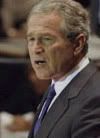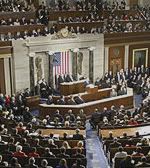

Oct 11th, 2002
Joint Resolution passed by Congress to Authorize the Use of United States Armed Forces Against Iraq
01 Whereas in 1990 in response to Iraq's war of aggression against
and illegal occupation of Kuwait, the United States forged a
coalition of nations to liberate Kuwait and its people in order to
defend the national security of the United States and enforce United
Nations Security Council resolutions relating to Iraq;
02 Whereas after the liberation of Kuwait in 1991, Iraq entered into
a United Nations sponsored cease-fire agreement pursuant to which
Iraq unequivocally agreed, among other things, to eliminate its
nuclear, biological, and chemical weapons programs and the means to
deliver and develop them, and to end its support for international
terrorism;
03 Whereas the efforts of international weapons inspectors, United
States intelligence agencies, and Iraqi defectors led to the
discovery that Iraq had large stockpiles of chemical weapons and a
large scale biological weapons program, and that Iraq had an
advanced nuclear weapons development program that was much closer to
producing a nuclear weapon than intelligence reporting had
previously indicated;
04 Whereas Iraq, in direct and flagrant violation of the cease-fire,
attempted to thwart the efforts of weapons inspectors to identify
and destroy Iraq's weapons of mass destruction stockpiles and
development capabilities, which finally resulted in the withdrawal
of inspectors from Iraq on October 31, 1998;
05 Whereas in 1998 Congress concluded that Iraq's continuing weapons
of mass destruction programs threatened vital United States
interests and international peace and security, declared Iraq to be
in "material and unacceptable breach of its international
obligations" and urged the President "to take appropriate action, in
accordance with the Constitution and relevant laws of the United
States, to bring Iraq into compliance with its international
obligations" (Public Law 105-235);
06 Whereas Iraq both poses a continuing threat to the national
security of the United States and international peace and security
in the Persian Gulf region and remains in material and unacceptable
breach of its international obligations by, among other things,
continuing to possess and develop a significant chemical and
biological weapons capability, actively seeking a nuclear weapons
capability, and supporting and harboring terrorist organizations;
07 Whereas Iraq persists in violating resolutions of the United
Nations Security Council by continuing to engage in brutal
repression of its civilian population thereby threatening
international peace and security in the region, by refusing to
release, repatriate, or account for non-Iraqi citizens wrongfully
detained by Iraq, including an American serviceman, and by failing
to return property wrongfully seized by Iraq from Kuwait;
08 Whereas the current Iraqi regime has demonstrated its capability
and willingness to use weapons of mass destruction against other
nations and its own people;
09 Whereas the current Iraqi regime has demonstrated its continuing
hostility toward, and willingness to attack, the United States,
including by attempting in 1993 to assassinate former President Bush
and by firing on many thousands of occasions on United States and
Coalition Armed Forces engaged in enforcing the resolutions of the
United Nations Security Council;
10 Whereas members of al Qaida, an organization bearing
responsibility for attacks on the United States, its citizens, and
interests, including the attacks that occurred on September 11,
2001, are known to be in Iraq;
11 Whereas Iraq continues to aid and harbor other international
terrorist organizations, including organizations that threaten the
lives and safety of American citizens;
12 Whereas the attacks on the United States of September 11, 2001
underscored the gravity of the threat posed by the acquisition of
weapons of mass destruction by international terrorist
organizations;
13 Whereas Iraq's demonstrated capability and willingness to use
weapons of mass destruction, the risk that the current Iraqi regime
will either employ those weapons to launch a surprise attack against
the United States or its Armed Forces or provide them to
international terrorists who would do so, and the extreme magnitude
of harm that would result to the United States and its citizens from
such an attack, combine to justify action by the United States to
defend itself;
14 Whereas United Nations Security Council Resolution 678 authorizes
the use of all necessary means to enforce United Nations Security
Council Resolution 660 and subsequent relevant resolutions and to
compel Iraq to cease certain activities that threaten international
peace and security, including the development of weapons of mass
destruction and refusal or obstruction of United Nations weapons
inspections in violation of United Nations Security Council
Resolution 687, repression of its civilian population in violation
of United Nations Security Council Resolution 688, and threatening
its neighbors or United Nations operations in Iraq in violation of
United Nations Security Council Resolution 949;
15 Whereas Congress in the Authorization for Use of Military Force
Against Iraq Resolution (Public Law 102-1) has authorized the
President "to use United States Armed Forces pursuant to United
Nations Security Council Resolution 678 (1990) in order to achieve
implementation of Security Council Resolutions 660, 661, 662, 664,
665, 666, 667, 669, 670, 674, and 677";
16 Whereas in December 1991, Congress expressed its sense that it
"supports the use of all necessary means to achieve the goals of
United Nations Security Council Resolution 687 as being consistent
with the Authorization of Use of Military Force Against Iraq
Resolution (Public Law 102-1)," that Iraq's repression of its
civilian population violates United Nations Security Council
Resolution 688 and "constitutes a continuing threat to the peace,
security, and stability of the Persian Gulf region," and that
Congress, "supports the use of all necessary means to achieve the
goals of United Nations Security Council Resolution 688";
17 Whereas the Iraq Liberation Act (Public Law 105-338) expressed
the sense of Congress that it should be the policy of the United
States to support efforts to remove from power the current Iraqi
regime and promote the emergence of a democratic government to
replace that regime;
18 Whereas on September 12, 2002, President Bush committed the
United States to "work with the United Nations Security Council to
meet our common challenge" posed by Iraq and to "work for the
necessary resolutions," while also making clear that "the Security
Council resolutions will be enforced, and the just demands of peace
and security will be met, or action will be unavoidable";
19 Whereas the United States is determined to prosecute the war on
terrorism and Iraq's ongoing support for international terrorist
groups combined with its development of weapons of mass destruction
in direct violation of its obligations under the 1991 cease-fire and
other United Nations Security Council resolutions make clear that it
is in the national security interests of the United States and in
furtherance of the war on terrorism that all relevant United Nations
Security Council resolutions be enforced, including through the use
of force if necessary;
20 Whereas Congress has taken steps to pursue vigorously the war on
terrorism through the provision of authorities and funding requested
by the President to take the necessary actions against international
terrorists and terrorist organizations, including those nations,
organizations or persons who planned, authorized, committed or aided
the terrorist attacks that occurred on September 11, 2001 or
harbored such persons or organizations;
21 Whereas the President and Congress are determined to continue to
take all appropriate actions against international terrorists and
terrorist organizations, including those nations, organizations or
persons who planned, authorized, committed or aided the terrorist
attacks that occurred on September 11, 2001, or harbored such
persons or organizations;
22 Whereas the President has authority under the Constitution to
take action in order to deter and prevent acts of international
terrorism against the United States, as Congress recognized in the
joint resolution on Authorization for Use of Military Force (Public
Law 107-40); and
23 Whereas it is in the national security of the United States to
restore international peace and security to the Persian Gulf region;
Now, therefore,
be it resolved by the Senate and House of
Representatives of the United States of America in Congress
assembled,
SEC. 1. SHORT TITLE.
This joint resolution may be cited as the "Authorization for the
Use of Military Force Against Iraq".
SEC. 2. SUPPORT FOR UNITED STATES DIPLOMATIC EFFORTS
The Congress of the United States supports the efforts by the
President to--
(a) strictly enforce through the United Nations Security Council
all relevant Security Council resolutions applicable to Iraq and
encourages him in those efforts; and
(b) obtain prompt and decisive action by the Security Council to
ensure that Iraq abandons its strategy of delay, evasion and
noncompliance and promptly and strictly complies with all relevant
Security Council resolutions.
SEC. 3. AUTHORIZATION FOR USE OF UNITED STATES ARMED FORCES.
(a) AUTHORIZATION. The President is authorized to use the Armed
Forces of the United States as he determines to be necessary and
appropriate in order to
(1) defend the national security of the United States against the
continuing threat posed by Iraq; and
(2) enforce all relevant United Nations Security Council
Resolutions regarding Iraq.
(b) PRESIDENTIAL DETERMINATION.
In connection with the exercise of the authority granted in
subsection (a) to use force the President shall, prior to such
exercise or as soon there after as may be feasible, but no later
than 48 hours after exercising such authority, make available to the
Speaker of the House of Representatives and the President pro
tempore of the Senate his determination that
(1) reliance by the United States on further diplomatic or other
peaceful means alone either (A) will not adequately protect the
national security of the United States against the continuing threat
posed by Iraq or (B) is not likely to lead to enforcement of all
relevant United Nations Security Council resolutions regarding Iraq,
and
(2) acting pursuant to this resolution is consistent with the
United States and other countries continuing to take the necessary
actions against international terrorists and terrorist
organizations, including those nations, organizations or persons who
planned, authorized, committed or aided the terrorists attacks that
occurred on September 11, 2001.
(c) WAR POWERS RESOLUTION REQUIREMENTS. --
(1) SPECIFIC STATUTORY AUTHORIZATION. -- Consistent with section
8(a)(1) of the War Powers Resolution, the Congress declares that
this section is intended to constitute specific statutory
authorization within the meaning of section 5(b) of the War Powers
Resolution.
(2) APPLICABILITY OF OTHER REQUIREMENTS. -- Nothing in this
resolution supersedes any requirement of the War Powers Resolution.
SEC. 4. REPORTS TO CONGRESS
(a) The President shall, at least once every 60 days, submit to
the Congress a report on matters relevant to this joint resolution,
including actions taken pursuant to the exercise of authority
granted in section 2 and the status of planning for efforts that are
expected to be required after such actions are completed, including
those actions described in section 7 of Public Law 105-338 (the Iraq
Liberation Act of 1998).
(b) To the extent that the submission of any report described in
subsection (a) coincides with the submission of any other report on
matters relevant to this joint resolution otherwise required to be
submitted to Congress pursuant to the reporting requirements of
Public Law 93-148 (the War Powers Resolution), all such reports may
be submitted as a single consolidated report to the Congress.
(c) To the extent that the information required by section 3 of
Public Law 102-1 is included in the report required by this section,
such report shall be considered as meeting the requirements of
section 3 of Public Law 102-1.

